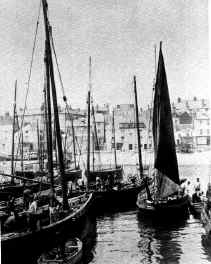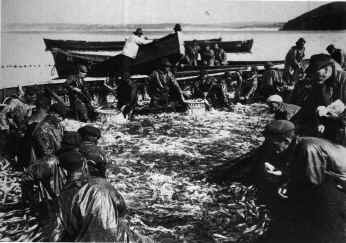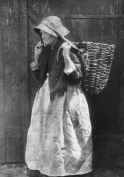Fishing
 In
Cornwall, there were four principal classes of fishing: seining, drifting, long-line, and
crabbing. By the reign of Elizabeth I, seining, which is the name given to the inshore
fishery for pilchards, had become a very important branch of the industry. Fish cellars,
or "palaces" as they were then called, were erected all-round the Cornish coast.
The fishermens' dwelling-house generally lay above the cellar, and was approached by a
flight of stone steps outside.
In
Cornwall, there were four principal classes of fishing: seining, drifting, long-line, and
crabbing. By the reign of Elizabeth I, seining, which is the name given to the inshore
fishery for pilchards, had become a very important branch of the industry. Fish cellars,
or "palaces" as they were then called, were erected all-round the Cornish coast.
The fishermens' dwelling-house generally lay above the cellar, and was approached by a
flight of stone steps outside.
The shoals of pilchards generally reached the Cornish coast about harvest time. For
some weeks before this, watch was kept for their arrival by men called "huers".
They were stationed on the cliff-tops, from where the shoals of fish could be seen moving
like a reddish-brown streak, just under the surface of the water. As soon as the fish were
sighted, the huer would shout out the warning cry of "Hevva", which was the old
Cornish work for a "school of fish". Immediately, the news would spread like
wildfire through the town, and men, women, and children would come hurrying down
to the beach to witness the catch on which so much depended. Meanwhile, the huer would be
signalling frantically to the boats awaiting his orders on the sea below, and having
manoeuvred them into the right position, he would take his long trumpet and shout out the
order to "shoot the seine". In a surprisingly short time, the great net was
pulled round in a large circle, and with its silvery mass of fish, drawn in towrds the
beach. On one occasion at St Ives, in 1834, 30 million pilchards were caught in this way
in one hour!
children would come hurrying down
to the beach to witness the catch on which so much depended. Meanwhile, the huer would be
signalling frantically to the boats awaiting his orders on the sea below, and having
manoeuvred them into the right position, he would take his long trumpet and shout out the
order to "shoot the seine". In a surprisingly short time, the great net was
pulled round in a large circle, and with its silvery mass of fish, drawn in towrds the
beach. On one occasion at St Ives, in 1834, 30 million pilchards were caught in this way
in one hour!
 From
the seine net, the pilchards were carried at top speed to the fish cellars. Here they were
placed in piles of alternate layers of salt and fish. This work had to be done at high
speed, and often went on far into the night and for many nights in succession. Men, women,
and children would come to give their help from all the surrounding villages, and no one
thought anything of sleep or rest till the precious fish were saved.
From
the seine net, the pilchards were carried at top speed to the fish cellars. Here they were
placed in piles of alternate layers of salt and fish. This work had to be done at high
speed, and often went on far into the night and for many nights in succession. Men, women,
and children would come to give their help from all the surrounding villages, and no one
thought anything of sleep or rest till the precious fish were saved.